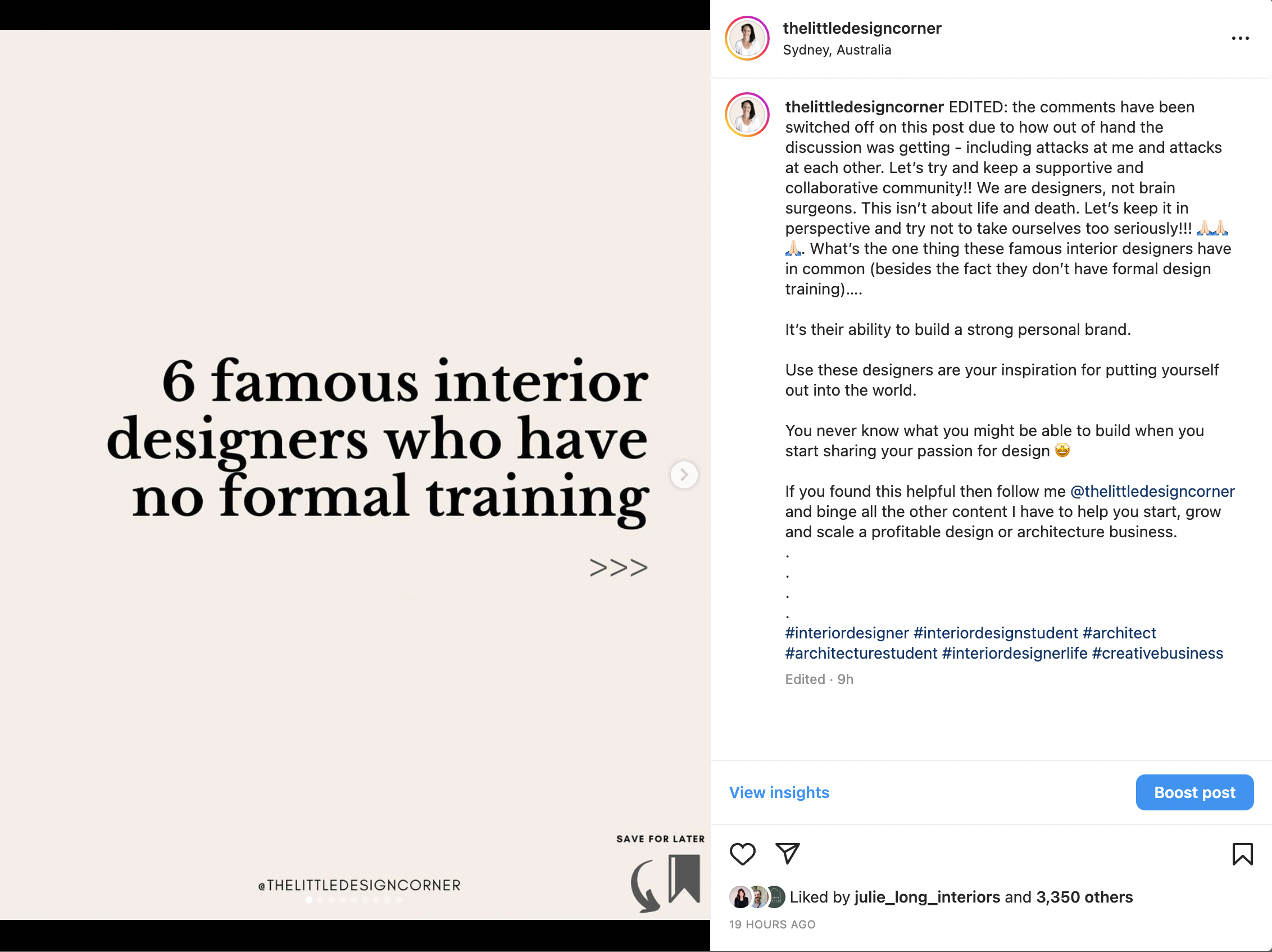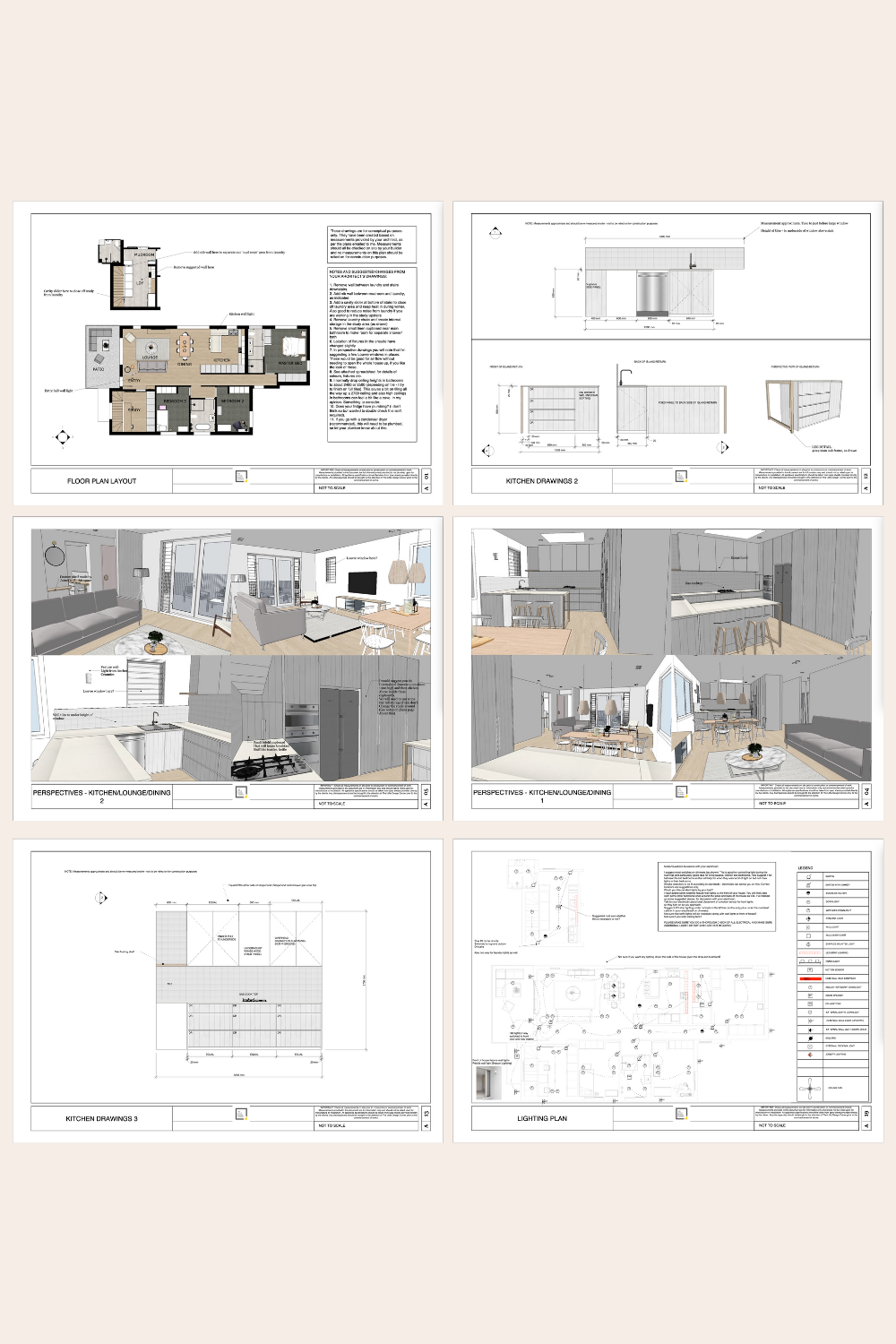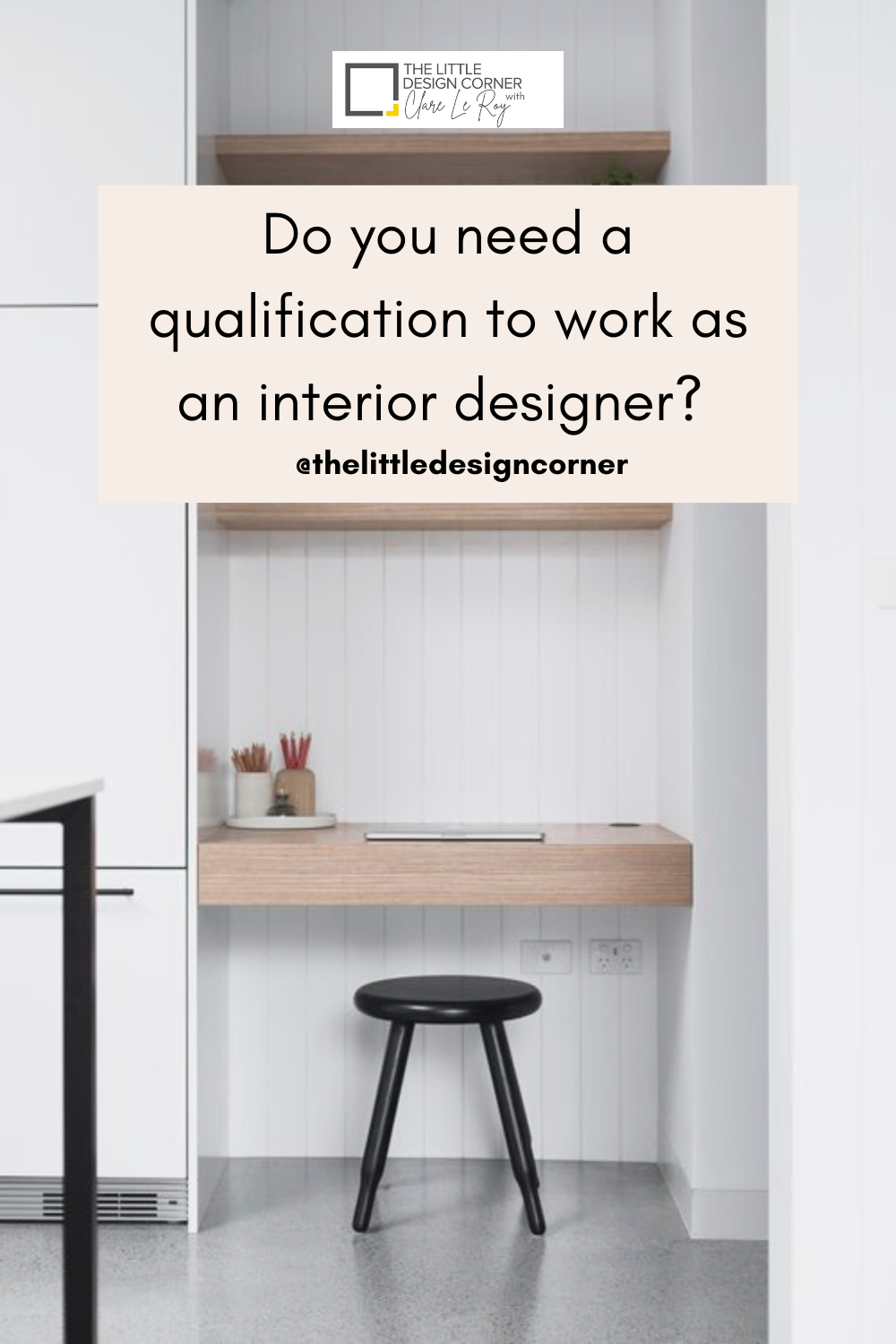Do you need a qualification to work as an interior designer?
Yesterday I posted something on Instagram and it caused SO much drama.
Here is the post:
The post seemed pretty harmless to me.
The purpose of it was to show that there is so much opportunity in the design industry and that you don’t necessarily need a design qualification in order to build a wildly successful business.
[If you’re wondering why there are only 5 designers in the post when it says 6 it’s because I had to remove one of the designers I had listed as people pointed out they had received training later on in their career].
Anyway, the point of my post was meant to be:
if you build a strong brand you can build a really successful business
just because someone doesn’t have formal training in design doesn’t mean they can’t become a well known and well respected designer
these designers are more (financially) successful than almost all of us so we can learn a lot about what they have done and how they have grown their businesses
It was also a post to help those who are just getting started in the industry feel confident that there are lots of pathways and opportunities.
The point of the post was to name some of the world’s most well known designers (who don’t have training) but have built very, very successful businesses and brands.
But after posting it everything went sideways in the comments.
Although the overwhelming response to the post was positive there were lots of comments that were rude, factually incorrect, unsupportive, aggressive and honestly just ridiculous.
Instead of the conversation being about the things I just wrote about above, it turned into a complete drama about whether or not I should have called the designers in the post ‘interior designers’ when they are actually just ‘fake designers’ (yes someone actually said that) because they have no qualifications.
Others said I should have called them interior decorators and not used the sacred ‘interior designer’ term for them as this should be saved only for those among us who have done a formal degree in interior design.
And at the point that someone wrote that I was setting my community up for failure by suggesting they shouldn’t be training as a designer (if you look at the post not a single part of it says even implies that 🤷🏻♀️) I decided enough is enough and turned the comments off.
By way of background to all of this, I am not formally trained as an interior designer myself.
And before I transitioned my business to the content hub that it is today, I worked as a designer for more than 6 years and built a very successful business helping clients 1:1 with their home renovation projects.
So I am one of those ‘fake’ designers that the ‘real’ designers in the comments yesterday were talking about. 😂
And just to be clear, I wasn’t doing anything wrong because (as of writing this) interior design is not a regulated industry where I live (Sydney, Australia).
But there seems to be so much confusion about whether or not you need a qualification to work as an interior designer.
So I decided to write my blog post today on my view about whether or not I think people should get formal training or qualifications in design before they start working in the industry.
And contrary to what lots of people in the comments of my post yesterday were suggesting, I don’t actually advocate that designers shouldn’t get formal training and I don’t necessarily think that people should enter the design industry without training.
I’m not even sure if I would these days (I started my business 10 years ago and the regulatory landscape was different back then), but more on that below.
What I actually think is that it depends…
And so I can clear up what my actual view is about whether or not someone should get formal qualifications to work in the design industry I decided to write out my thought process on this and the questions I would ask myself if I were starting my business today.
But first, my disclaimer :)
Before we get started I want to point out that I am NOT a lawyer and these are my personal views on this topic, not the legal view for your jurisdiction. I strongly recommend that if you are entering the industry you discuss the type of work you want to be doing with a lawyer who is experienced in the industry and make sure that you:
understand what the laws and legislation are and any professional registration you need (if any) to work in your chosen field
have contracts in place, prepared by a lawyer, that protect you (if you have your own business)
With that out of the way, here are the questions and the decision making that I would work through if I were starting my business over now and was trying to decide whether I did formal training.
Question 1: What sort of work do I want to be doing in the industry?
This would be the first place I would start.
I would make sure I knew what sort of work I wanted to be doing and ensure I was clear about the difference between the professionals that work in the industry - e.g. a stylist, an interior decorator, an interior designer, a structural designer, a draftsperson, an interior architect and an architect (there’s others as well - these are just some of them).
One of the issues with people entering the industry is that they often don’t understand the differences between these types of professionals. There has been a blurring of roles and responsibilities and many people in the industry are unknowingly doing work that they are not lawfully meant to be doing.
Most clients also don’t know the difference so they ask their designers to do work that the designer themselves shouldn’t actually be doing. And often the designer wants to please their client, so they do it anyway.
This is particularly the case between the disciplines of interior decoration and interior design so let’s look at the differences between these.
An interior decorator typically focuses on the aesthetic and decorative elements of a space, such as colour schemes, fabric and soft furnishing selections and styling/furniture arrangements. They may, in some instances, also assist with selecting finishes and fixtures. In most parts of the world there’s no legal requirement to have a formal qualification to work as an interior decorator (but make sure to check this yourself).
An interior designer, on the other hand, is typically responsible for both the aesthetic and functional aspects of a space, such as designing joinery/millwork design, space planning, layout and lighting (and lots of other things as well). They may also work on larger scale projects such as home renovations/remodels or new construction projects.
One important thing to point out is that the distinction between these two professions varies in different countries and jurisdictions, which is where some of the drama from yesterday’s post came from I think.
In some places it is possible to work as an interior designer without formal training. However, in many jurisdictions, it is considered a professional field and having formal education or certification is considered the standard. Also, in certain places the title "interior designer" is protected by law, meaning that only those who have met certain qualifications can legally use it.
So the first question is to ask yourself what sort of work you want to be doing in the industry and do lots of research into the different types of professional pathways exist and which one you want to take.
Question 2: Does my local jurisdiction require me to have a qualification to call myself an interior designer?
OK so let’s assume that from the research above I decided that I wanted to work as an interior designer.
The next thing to find out is what the law is in the jurisdiction where I will be working.
are there specific qualifications I need to do to legally work (and call myself) an interior designer?
do I need certification of some sort? What does that involve?
am I required to do any ongoing professional development in order to maintain my registration (if so, what is that?)
As mentioned above, in some countries, the term "interior designer" is not regulated, so there are no specific education or certification requirements. However, in other countries, there may be legal requirements for working as an interior designer such as having a certain level of education or passing a certification exam.
This is often difficult information to find out but a good place to start is by researching your local professional membership organisation that advocates for the industry - such as The Design Institute or Australia (DIA) or The American Society of Interior Designers (ASID).
If I found out that I required formal education, a specific qualification or particular certification then I would definitely make sure I got that.
Question 3: Do I want to get employed as a designer in someone else’s firm?
Another question I would ask myself is how I wanted to work in the industry. Did I want to start my own business or did I want to get a job in someone else’s design business?
If I decided I wanted to work for someone else then I would definitely get a qualification in whatever field I was looking to work in (even if this was interior decoration). The design industry is extremely competitive and it will be hard to compete against other candidates without some kind of formal training.
Most business owners don’t have the time to train you on the job so you’ll need to get this training and education sorted out for yourself if you want to be a competitive candidate in job interviews.
Question 4: Do I want to work for myself as a designer? (i.e. own my own business)
If, on the other hand, I decided that I wanted to start my own design business then whether or not I got formal training would again come down to:
what the laws were in the jurisdictions I wanted to work
the type of work I was going to be doing in my business (decoration, styling, full interior design services)
how confident I was in my design skills and knowledge about the industry (e.g. drafting skills, design theory, building codes, compliance, drawing and other aspects of what I would be doing)
how much ‘on the job’ experience I had already had in the industry
If I was confident in my design skills and compliance and had learned these elsewhere AND I didn’t have any legal reason to need a qualification then I wouldn’t actually need to get one.
BUT…
Keep in mind the legislation in the design industry is changing fast and even though I didn’t do formal training in design myself if I were starting over again now I would probably get the qualifications I needed to work as an interior designer in order to protect myself and my business from regulatory changes in the future.
It would also give me lots of confidence as I started working with clients.
Question 5: Do I want to work as an interior decorator/stylist?
If I decided that I wanted to be working as a stylist or interior decorator only, and not doing any renovation work, joinery design, space planning changes or that sort of thing, then I probably wouldn’t bother with any formal training if I were confident in my decoration and styling skills.
Again, it’s important to check regulations around this for where you are working, but in most jurisdictions interior decoration is not a pathway that requires formal training and it would come down to personal preference.
Question 6: Do I want to work in another part of the design industry - e.g. open a store/shop, work as an interiors photographer, become a content creator (e.g. Instagram creator)
If I decided that I wanted to work in some other part of the design industry then, again, a formal qualification in design probably wouldn’t be needed.
But, if you wanted to work in someone else’s businesses within the industry (e.g. as a stylist or in a design store, for example) you may, again, find that you can be more competitive in the interview process if you’ve had some kind of training in design.
So - would I do formal training in design if I were starting my business today?
Yes, I probably would.
Personally, the work I enjoy the most is the work that’s typically classified as ‘interior design’ - things like designing joinery and thinking about space planning. I also enjoy styling and decoration, but I like the other part of interior design as well.
And because the industry is changing fast (and I see new regulations being introduced all the time) in order to protect myself from future industry changes I would likely pursue formal training to give me the confidence that any business I started or career I began would be protected over the long term.
This wasn’t the case when I started my business 10 years ago, just like it wasn’t for many, many other designers who have built successful businesses without being formally trained as interior designers.
I will end with a comment that one (formally trained) designer wrote on the post yesterday before I turned off the commenting.
I couldn’t agree more with this and it gives us all something to think about...
Having formal education or a certification can be beneficial in terms of credibility and may open up more opportunities for the type of services and work you do. It may also be legally required in your jurisdiction so make sure you are well informed about the regulations where you work. If you choose not to do formal training then make sure you are only doing the types of work you are lawfully allowed to be doing. Seek advice from a lawyer who is experienced with the design industry if needed.
Overall it's important to note that even without a formal education you can still work in the field of design.
There are so many different pathways and opportunities whether you study or not.
And that was the point of my post yesterday!! :)
Just make sure you go into the profession with your eyes open and that you educate yourself on the legalities and boundaries of what you can and can’t work on.
Thanks for reading and catch you in my next post :)
Clare x
Dr Clare Le Roy
Courses and Templates for Designers and Architects
DO YOU WANT TO….
Improve your professionalism?
Find more clients?
Bring in more revenue?
Create better systems and processes?
Then check out my business courses and templates for designers and architects.
These courses and templates leave you with work done - not just a long list of things you need to do next. We have a really strong focus on taking action and getting things created that improve your business.










